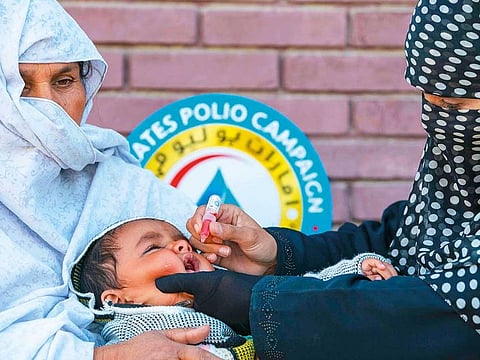‘More efforts needed to end polio in Pakistan’
GPEI says more government staff need to be engaged in programme at all levels

Also In This Package
Islamabad: More efforts are needed to reach the levels of government leadership, drive, and use of real-time data to beat Polio in Pakistan, according to the disease monitoring body of Global Polio Eradication Initiative (GPEI).
Shahina Maqbool in The News International said that while the Polio Oversight Board (POB) has acknowledged the Pakistan government’s commitment at the national and provincial levels to end polio, the monitoring body believes “more is needed to reach the levels of government leadership, drive, and use of real-time data” as efficiently witnessed in the country’s COVID-19 response.”
The POB has called upon the Prime Minister’s Special Assistant on Health to strengthen government leadership of the Polio Eradication Programme by appointing senior officers of the Ministry of National Health Services to the National Emergency Operations Centre (NEOC) for Polio Eradication; ensure regular engagement at the NEOC, and participating in review meetings with provincial Chief Secretaries and Ministers of Health following Supplementary Immunisation Activities (SIAs).
According to The News International, Shahina said: “Similarly, while energetic leadership is available at the NEOC and PEOCs, more government staff need to be engaged in the programme at all levels.”
The POB sees the current trough in virus transmission as an important opportunity to be capitalised because the “next six months are critical to setting up the programme to stop transmission in 2022.”
Concluding an important meeting in Islamabad, the visiting members of the highest decision-making body in GPEI has offered strategic direction to Pakistan’s future efforts for polio eradication with a set of recommendations encompassing three key stakeholders--the government of Pakistan, GEPI partners, and the NEOC.
According to a copy of the recommendations, the POB has encouraged the government to continue domestic financing of the polio programme in 2022 through development of a PC1. Importantly, it has also advised NEOC to update the National Emergency Action Plan (NEAP) for Polio Eradication on priority basis, capturing agreed activities of the entire partnership; and to signal any updated resource requirement on an urgent basis for 2021 and 2022.
The POB has recommended that the Chief Secretaries and Ministers of Health in Khyber Pakhtunkhwa and Sindh “protect their hard-won gains by routinely reviewing the programme’s success in reaching chronically missed children in priority communities,” and that the Chief Secretary and Minister of Health in Balochistan engage Deputy Commissioners on performance management accountability linked to quality improvements in the polio programme.
Sign up for the Daily Briefing
Get the latest news and updates straight to your inbox









